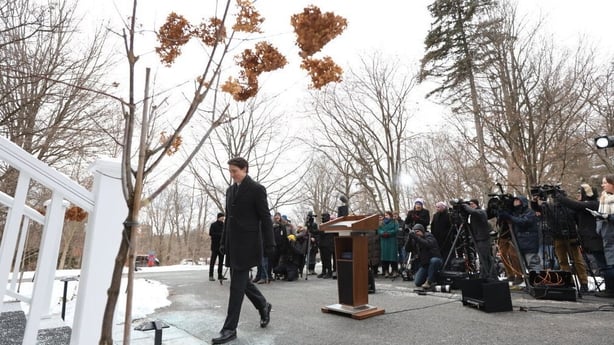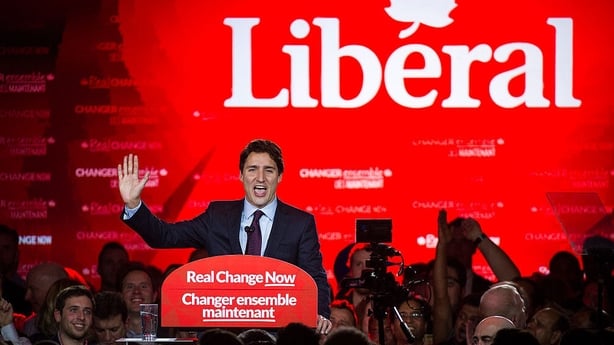Canadian Prime Minister Justin Trudeau has announced that he intends to step down as leader of the ruling Liberals after nine years in office, but will remain in his post until the party chooses a replacement.
Mr Trudeau, under heavy pressure from Liberal legislators to quit amid polls showing the party will be crushed at the next election, said at a news conference that parliament would be suspended until March.
That means Mr Trudeau will still be prime minister on 20 January when US President-elect Donald Trump takes office.
Mr Trump has threatened to impose tariffs that would cripple Canada's economy.
"This country deserves a real choice in the next election, and it has become clear to me that if I'm having to fight internal battles, I cannot be the best option in that election," Mr Trudeau said.
The United States described Mr Trudeau as a "stalwart friend" and said that Washington would "stand with" Canada and its people as they select a new leader.
Tánaiste and Minister for Foreign Affairs Micheál Martin paid tribute to Mr Trudeau, saying he "made a significant contribution to the global stage".
He said: "Under his leadership, the relationship between Ireland and Canada has deepened.
"His support for the Irish-Canadian community, based on our shared values and historical and cultural bonds, has strengthened the friendship between our two countries."

Mr Trudeau, 53, took office in November 2015 and won reelection twice, becoming one of Canada's longest-serving prime ministers.
But his popularity started dipping two years ago amid public anger over high prices and a housing shortage, and his fortunes never recovered.
Polls show the Liberals will badly lose to the official opposition Conservatives in an election that must be held by late October, regardless of who the leader is.
The key events charting Trudeau's fortunes
Parliament was due to resume on 27 January and opposition parties had vowed to bring down the government as soon as they could, most likely at the end of March.
But if parliament does not return until 24 March, the earliest they could present a non-confidence motion would be some time in May.
Mr Trudeau had discussed with Finance Minister Dominic LeBlanc whether he would be willing to step in as interim leader and prime minister, one source said, adding that this would be unworkable if Mr LeBlanc plans to run for the leadership.
Calls for him to step aside grew since December, when he tried to demote Canada's Finance Minister Chrystia Freeland, one of his closest cabinet allies, after she pushed back against his proposals for more spending.
Ms Freeland quit instead and penned a letter accusing Mr Trudeau of "political gimmicks" rather than focusing on what was best for the country.

Mr Trudeau propelled the Liberals to power in 2015 promising "sunny ways" and a progressive agenda that promoted the rights of women and a promise to fight climate change.
But the everyday realities of governing gradually wore him down and like many Western leaders, the need to deal with the effects of the pandemic ate up much of his time.
Although the government spent heavily to protect consumers and businesses, racking up record budget deficits, this provided little protection from public anger as prices soared.
A botched immigration policy led to hundreds of thousands of arrivals, straining an already overheated housing market.
Former Taoiseach Leo Varadkar has said that Mr Trudeau was a "prime minister who achieved a lot for Canada".
Speaking on RTÉ's Drivetime he said Mr Trudeau's dealings with Mr Trump and work on climate change were positive.
"I think he will be seen as one of the great Canadian prime ministers," said Mr Varadkar.
He said that Mr Trudeau was "a very decent, a very personable person" who rang to congratulate Ireland when it beat Canada to a seat on the UN Security Council.
"He’s somebody I got to know quite well," added Mr Varadkar.
"My first official visit overseas was to Canada and the first inbound visit was his visit to Ireland.
"We would have met on loads of occasions down through the years."
